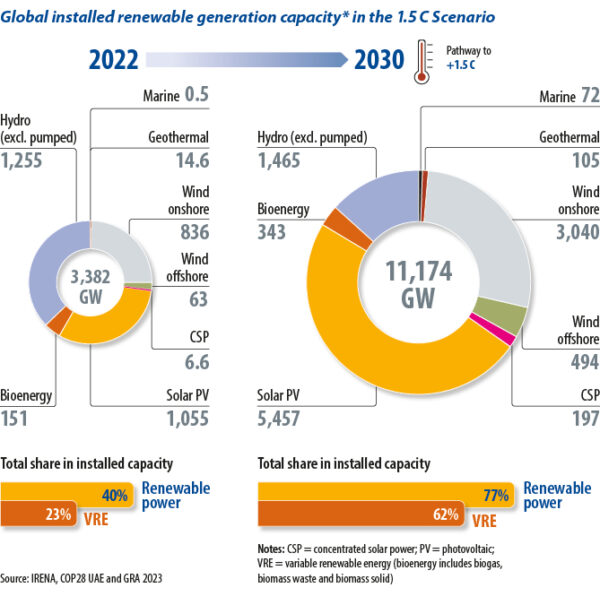Solar power will play a crucial role in the planned tripling of renewable energy capacity by 2030, delivering an unprecedented fivefold generation capacity increase by the end of 2030, to 5.4 TW – and some forecasts are even more optimistic. Despite the competitiveness of renewables, led by solar, challenges persist and require urgent policy action on financial flows, permitting, electricity grids, and supply chains.
The first step to delivering the renewable energy capacity the planet requires is to align global policy around a renewables transition. The GRA launched the #3xRenewables campaign in September 2023 with the aim of focusing attention on this urgent objective, in order to deliver rapid progress.
Just five months after that launch, some 300 organizations have signed an open letter calling for #3xRenewables and 198 countries and regional blocs agreed to the target at COP28, with 130 of them also committing to a global renewables and energy efficiency pledge. In order to deliver on that global commitment, governments must focus on four core actions, outlined below.
 Financial flows
Financial flows
The flow of funds – including export finance and climate finance, as well as public and private capital – must be redirected from fossil fuel energy to the build-out of renewables and grids. In a policy report developed by the GRA, the International Renewable Energy Agency, and the COP28 presidency, we found that a $10 trillion investment in renewable energy deployment between 2023 and 2030 will be key to align with a global net-zero trajectory by 2050. While this may be a staggering number, $7 trillion is currently paid in fossil fuel subsidies annually and an additional $1 trillion was invested into fossil fuels in 2023. There is a need for a long-term sustainability perspective, rather than more capital.
To achieve our global target, we must also prioritize low-cost and long-term financing in the least developed economies and off-grid communities for a “just energy transition.”
Supply chains
Strengthening supply chains is crucial to avoid vulnerability and ensure all benefits from the opportunities offered by the energy transition. Investing in local supply chains promotes job creation, economic growth, and stable renewable energy expansion. Governments should prioritize transparent supply chains and should incentivize adherence to high environmental, social, and corporate governance (ESG) standards to bolster investor confidence and eliminate market barriers to pave the way to achieving solar targets. ESG standards such as the “do no significant harm” principle, as well as best practice initiatives such as the Solar Stewardship Initiative, will also be critical for ecologically and socio-economically sustainable development.
Electricity networks
Grid upgrades and development are a critical factor in the growth of renewables. Beyond accommodating the variability of renewable energy, the focus of grid upgrades should prioritize bolstering resilience, flexibility, and accessibility to smart grids. Solar power can be a cornerstone of energy security, through decentralized energy generation systems ranging from utility-scale sites to individual homes – offering unique opportunities for the least developed countries to expand energy access. Achieving this means tackling both transmission and distribution grid issues to deliver cost-competitive solar energy globally.
Solar’s decentralized potential enhances resilience against grid failures and other crises, powering essential services such as fridges for food and vaccines, light for construction, and mobile phone charging points. Policymakers must integrate decentralized solar design into national planning for a secure and just future.
Permissions process
With lengthy timelines and overlapping responsibilities among government entities, permitting processes can represent a significant roadblock for the rapid expansion of solar, both large and small scale.
To overcome this obstacle, permitting procedures for solar projects should adopt a standardized and clearly defined process proportionate to the size of installation and incorporating a “one-stop shop” approach. Considering the relatively small impact of rooftop solar, permitting processes for small-scale projects should be much more streamlined, compared to utility-scale developments. In some countries, the permitting burden has even been removed entirely for residential and commercial rooftops for installations with a generation capacity of up to 5 MW.
Cautious optimism
As we look ahead, the renewables sector is optimistic but realistic. The technology is at our disposal, renewables are cost-competitive and will create millions of jobs, and the benefits of a green grid are undeniable. Realizing this vision, however, demands policies which align to remove barriers and direct finance where it will have the most significant impact. This is where organizations such as the Global Solar Council (GSC) are critical – uniting the world’s solar industry. By bringing together expertise and stakeholders from regions across the world, the GSC, in strong collaboration with other renewable energy sectors, through the GRA, can drive the way to shaping our sustainable energy landscape.
About the author: Bruce Douglas is CEO of the Global Renewables Alliance, which includes leading industry associations for wind, geothermal, hydropower, long-duration energy storage, and green hydrogen. He has 25 years of international experience in the promotion of renewable energy and electrification and helped found the Global Solar Council in 2015, when he worked for trade body SolarPower Europe.

This content is protected by copyright and may not be reused. If you want to cooperate with us and would like to reuse some of our content, please contact: editors@pv-magazine.com.








By submitting this form you agree to pv magazine using your data for the purposes of publishing your comment.
Your personal data will only be disclosed or otherwise transmitted to third parties for the purposes of spam filtering or if this is necessary for technical maintenance of the website. Any other transfer to third parties will not take place unless this is justified on the basis of applicable data protection regulations or if pv magazine is legally obliged to do so.
You may revoke this consent at any time with effect for the future, in which case your personal data will be deleted immediately. Otherwise, your data will be deleted if pv magazine has processed your request or the purpose of data storage is fulfilled.
Further information on data privacy can be found in our Data Protection Policy.